176 Search Results for prompt
October 11, 2018
by Carole Zangari -
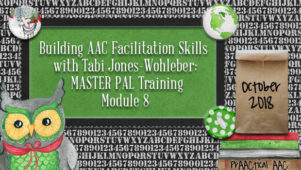
Our AAC Training Series continues today and we remain extremely appreciative that West Virginia based SLP Tabi Jones-Wohleber allows us to share these presentation materials. Today’s training materials center on a topic that will help AAC interventionists strengthen their relationships with AAC learners and provide important language learning opportunities at the same time. This module, Response NOT Required, is all about interactions that engage our learners and invite them into the conversation. The instructional time for Module 8 is about 20 minutes so this can feasibly be shared in a formal or informal sharing session before or after the school day. ::::::::::::::::::::::::::::::::::::::::::::::::::::::::::::::::::::::::::::::::::::::::::::::::::::::::::::: Model as a MASTER PAL Module 8: Response NOT Required Facilitator Guidelines When I talk about modeling without expectation of a response, I often get quizzical sideways glances. It is not an intuitive way of interacting, especially in an educational environment where responding is inherent in classroom... [Read More...]
October 4, 2018
by Carole Zangari -
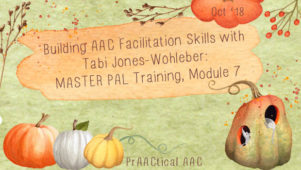
Welcome back to our AAC partner training series, Model as a MASTER PAL, created by SLP Tabi Jones-Wohleber. Today, we continue with materials to help communication partners interact with AAC learners in a supportive fashion. ::::::::::::::::::::::::::::::::::::::::::::::::::::::::::::::::::::::::::::::::::::::::::::::::::::::::::::::::::::::::::::::::::::::::::::::::::::::::::::::: Model as a MASTER PAL Module 7: Engage Naturally Facilitator Guidelines This module covers a lot of territory. From the behaviors of communication partners that support the process of language development to creating communication opportunities, to the language we use with a child to talk about their device, to fostering communicative competence, naturalistic engagement is shaped in many ways. The importance of this conversation lies in the fact that genuine engagement and mutual respect are where learning happens. It is also how meaningful social relationships are built. This module invites participants to reflect on factors that shape the quality of interactions in order to maximize the potential for communicating, learning and creating meaningful social,... [Read More...]
September 27, 2018
by Carole Zangari -
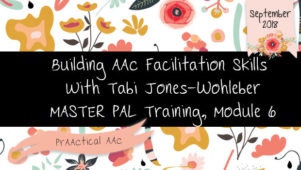
Let’s be honest: The most advanced AAC device in the world isn’t going to be very helpful unless it’s well-implemented. That’s why it is so important that communication partners, particularly those who spend lots of time with people use AAC, get training on ways to support the AAC learner. Tabi Wohleber-Jones is back with us today to share the 6th module in the MASTER PAL series. This module is all about time. Model as a MASTER PAL Module 6: Time: Wait-Time, Think-Time and Time for Language to Develop Facilitator Guidelines This 6th module in Model as a MASTER PAL explores both short-term and long-term factors related to time, as necessary for AAC skill development. These modules may be explored in a single learning session or split into two sessions, 20-30 minutes each. Firstly, language development occurs gradually over time, years actually. Teaching language with AAC takes time as well. ... [Read More...]
September 20, 2018
by Carole Zangari -
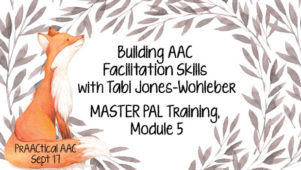
Our AAC Training Series continues today and we are incredibly grateful to Tabi Jones-Wohleber for sharing these presentation materials with us. Today’s training materials center on a topic that is near and dear to my prAACtical heart: Using statements more often than questions. The instructional time for Module 5 is about 90-120 minutes which allows time for discussion and practice. ::::::::::::::::::::::::::::::::::::::::::::::::::::::::::::::::::::::::::::::::::::::::::::::::::::::::::::: Model as a MASTER PAL Module 5: Statements More Than Questions Facilitator Guidelines STATEMENTS MORE THAN QUESTIONS Questions are necessary to help us learn about the things, people, and activities in our environment and beyond. However, interactions heavily weighted with questions do not often yield the quality exchanges required to build relationships, gain understanding, foster autonomous communication or facilitate initiation. This module explores the power of statements (aka nondirective language and descriptive teaching) in shaping meaningful engagement for learning and socially interacting. It includes interactive activities, video links, lots... [Read More...]
September 13, 2018
by Carole Zangari -
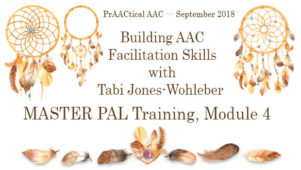
Ready for more AAC training materials? In today’s post, Tabi Jones-Wohleber is sharing another module in the MASTER PAL series. This 30-minute session focuses on the role of multiple modalities in AAC. :::::::::::::::::::::::::::::::::::::::::::::::::::::::::::::::::::::::::::::::::::::::::::::::::::: Model as a MASTER PAL Module 4: Accept Multiple Modalities Facilitator Guidelines We all use multiple modalities to communicate…speech, text, email, a gesture, facial expressions. In much the same way we encourage young children to interact by assigning meaning to their gestures, expressions, and utterances, responding meaningfully to the communicative attempts of those who use AAC validates and encourages the effort. Honor all modalities and respond by modeling AAC as much as possible(regardless of the modality used by the PWUAAC) teaches AAC. Seize the opportunity to teach and expand language. After all, multi-modal communication shapes the human experience. For this training you will need: The Presentation Slides The Presentation Handout The Facilitator’s Guide Warm-up Discussion: Thinking Prompt... [Read More...]
September 6, 2018
by Carole Zangari -
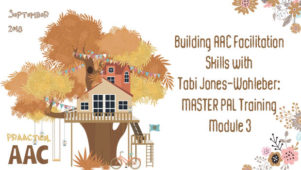
Our training series continues with West Virginia-based SLP Tabi Jones-Wohleber, who works with the AT Team for Frederick County Public Schools in Maryland and provides services to infants and toddlers in the West Virginia Birth to Three programs. In the first two posts, Tabi shared the Overview and Modeling modules and their accompanying resources. In today’s post, the training focuses on an important topic, motivation. ::::::::::::::::::::::::::::::::::::::::::::::::::::::::::::::::::::::::::::::::::::::::::::::::::::::::: Model as a MASTER PAL Module 3: Motivate Facilitator Guidelines Genuine motivation goes well beyond gummies and goldfish; reinforcers are only one small part of the picture as we endeavor to understand what truly drives an individual’s desire to learn and communicate. So much of the time it is the quality of the relationship and the meaningfulness of the interaction. This module discusses the importance of motivation in learning and engaging, whether intrinsic or extrinsic, as well as the undesirable consequences that occur when lack of motivation... [Read More...]
August 30, 2018
by Carole Zangari -
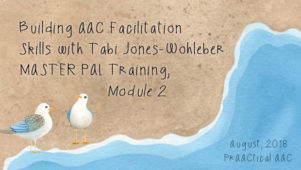
It’s a good day to talk training and we’re incredibly grateful to SLP Tabi Jones-Wohleber for sharing her partner training resources with us. In addition to her work with the AT Team for Frederick County Public Schools in Maryland, Tabi serves young children and their families at West Virginia Birth to Three programs. In the initial post, Tabi introduced the overview module and its accompanying resources. Today, we move onto Module 2 where the focus is on aided language input. ::::::::::::::::::::::::::::::::::::::::::::::::::::::::::::::::::::::::::::::::::::::::::::::::::::::::: Modeling AAC is unquestionably a key component of teaching AAC. Most frequenters of PrAACtical AAC understand that modeling is a naturalistic strategy that functions to support language development by SPEAKING YOUR WORDS. However, misconceptions abound, which often results in modeling opportunities characterized as imitation or compliance tasks. This module unpacks the imperative of modeling to provide a common understanding of what it is (and is not), and why it is a... [Read More...]
August 23, 2018
by Carole Zangari -
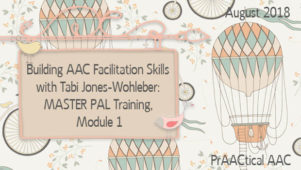
Are you… Hoping to train team members to be better communication partners for their AAC students/clients but overwhelmed by the thought of all the preparation? Relatively new to AAC and not sure what content to share in your training? Looking for additional resources to utilize in your existing training sessions? Good news, AAC friends! This post is for you. We’re so happy to have SLP Tabi Jones-Wohleber returning to the blog to share more of her wonderful AAC resources. Tabi works with young children at the West Virginia Birth to Three program and serves on the AT Team for Frederick County Public Schools in Maryland. Today, she launches a new series on partner training that focuses on the use of aided language input and other facilitative strategies. There are 11 modules in all (1 overview for administrative discussions and 10 for communication partners) and each one includes slides, handouts, discussion prompts, links... [Read More...]
August 20, 2018
by Carole Zangari -
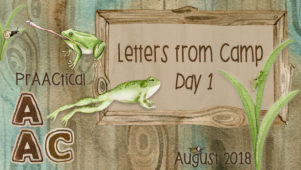
Mosquitos and sunscreen Swimming, canoeing, and fishing Frogs, grasshoppers, and lightning bugs Campfires, s’mores, and ghost stories AAC devices and alternative pencils?? It’s hard to believe that 3 years have gone by since guest author Tina Moreno first shared her experiences at Camp ALEC with our PrAACtical AAC readers. (You can read that article here.) This year, Tina is back to share some of the activities that the staff and volunteers are using to help AAC learners strengthen their skills in reading and writing. Take a peek at the Day 1 Literacy Activities. :::::::::::::::::::::::::::::::::::::::::::::::::::::::::::::::::::::::::::::::::::::: Camp ALEC is underway at beautiful Indian Trails Camp in Grand Rapids, MI this week. Twenty-one campers arrived on Sunday evening to spend the week on their own while engaged in motivating reading and writing activities, plus typical summer camp experiences. Sixteen educators and speech-language pathologists traveled from as far away as New Zealand to obtain... [Read More...]
July 15, 2018
by Carole Zangari -
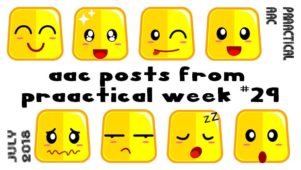
It’s been a busy week out there in AAC Land! Here are are a handful of posts you may have missed. Monday – Insufficient Options: Messages to Consider Adding to the AAC Device Tuesday – AAC Link Up Wednesday – Video of the Week: AAC Explainer Thursday – PrAACtical Perspectives on Part-time AAC Use And if you have more time for browsing, you can peruse some of these links. ::::::::::::::::::::::::::::::::::::::::::::: Adapting Books with Visual Scenes AAC and Dementia with Dr. Melanie Fried-Oken Aided Language Input During Play Addressing the 4 Most Overlooked Operational Skills for High Tech AAC Users Reducing Prompt Dependence in AAC Learners: 5 Things to Try :::::::::::::::::::::::::::::::::::::::::::::









